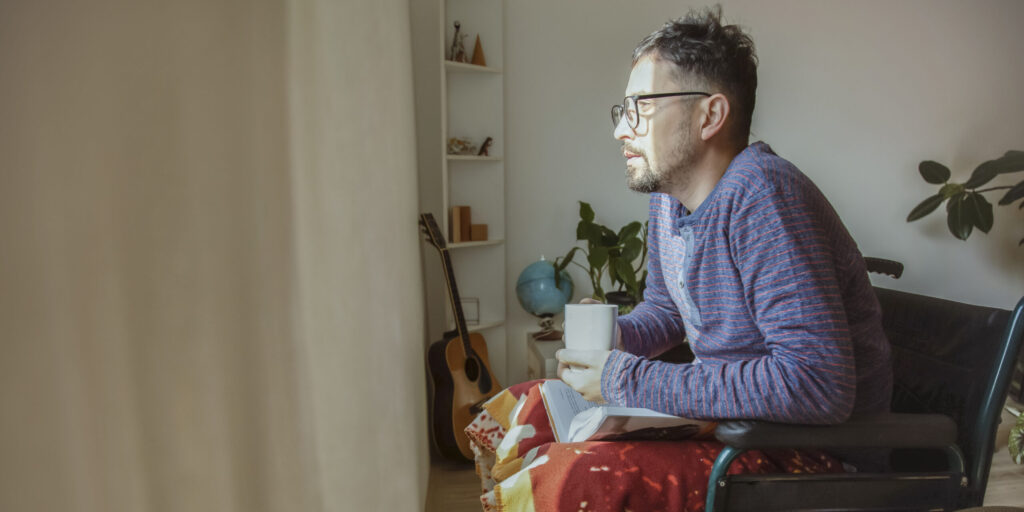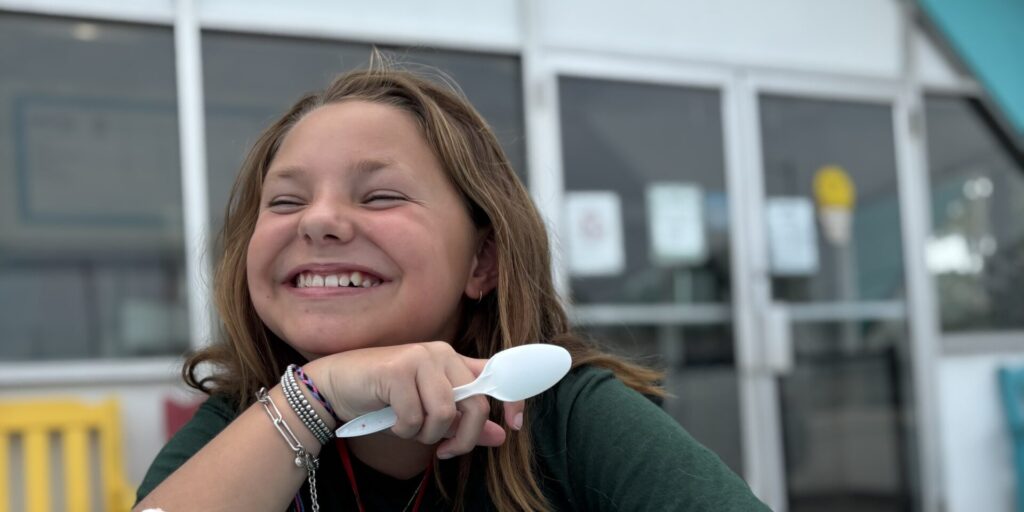
Coping with Loneliness at the Holidays
By Claire Sykes | Monday, November 18, 2024
Everyone feels lonely sometimes. It’s just part of being human. Maybe you’re new to town and don’t know anyone yet, or it’s a Saturday night and it seems like everyone’s busy but you. The holidays can also bring feelings of loneliness for many people. If this time of year weighs you down, read on for strategies to lessen loneliness from people in the neuromuscular disease community who have been there.
Loneliness hurts
Loneliness arises when we desire more connection with others than we have. “It’s an emotion generated by our thoughts, usually negative ones,” says Amber Bosselman, a disability life coach in St. Paul, Minnesota, who lives with spinal muscular atrophy (SMA).
Humans are wired to be sociable to survive as a species. Loneliness increases our cortisol levels, throwing us into a fight-flight-freeze response where we can feel fear, anxiety, anger, and sadness. When we have too much of this stress hormone for too long, we’re met with melancholy, depression, dread, and despair. This can also have physical effects: suppressing our immune system, straining our cardiovascular system, and raising our risk of Alzheimer’s disease.
Not feeling so jolly?
Why do many people feel lonely during the holidays? “It’s those darn expectations, those picture-perfect moments in your mind where society and the media tell us we should be surrounded by friends and family having a wonderful time,” says Amber. Maybe we can’t have that and wish we could, or we can’t help comparing what we have to an unattainable ideal.
For those living with a disability, there are a variety of circumstances that can lead to feelings of loneliness. Accessibility barriers, transportation limitations, or not living near friends and family can lead to isolation, especially in the winter. Additionally, a disability can sometimes lead individuals to feel lonely or left out even when gathering with friends and family.
Over the holidays, Nena Jackson’s home in Byram, Mississippi, is filled with family. “But I feel separate from them,” she says. Nena has been living with inclusion body myositis (IBM) for about 20 years, and she mostly uses her power wheelchair for mobility.
“I see my family do things I used to be able to do, like get down on the floor and play with the kids,” she says. “I used to cook big holiday dinners, but now I can’t stand for very long. This makes me feel so disconnected, even though I’m right there with everyone.”
Rodrigo Duran, who lives with congenital muscular dystrophy (CMD), also feels lonely during family holiday gatherings. “I’m the only one with a disability,” says the Dallas resident. “Born in the US to conservative Mexican parents, there’s a lot of pride in my culture and indirect discrimination of people with disabilities. I could be at Thanksgiving with family, and they’d all be talking together without me.”
10 ways to ease loneliness
These experiences might sound familiar to many people living with disabilities, but there are also ways to help alleviate negative emotions. Community members and experts recommend these tips for tackling holiday loneliness:
- Acknowledge your emotions. “Don’t cover them up with Band-Aid fixes. Whatever you resist will persist and be waiting for you later,” says Amber. “It’s better to feel the loneliness. It’ll pass after a couple of minutes and might return, but then you can better handle each incoming wave.”
- Tame your thoughts. Ruminating might lead you into a downward spiral. To reel yourself back in, Amber suggests deep breathing and focusing on being in the moment. “Concentrate on what you see, smell, hear, touch, or taste,” she says.
- Get it out of your head. The thoughts and feelings inside you can build up and become overwhelming. Amber likes to put her thoughts in a journal, but talking it out works, too. “Writing your thoughts or dictating, typing, or video-recording them — or talking them out with someone — forces the brain to slow down,” she says. Rodrigo, an artist, draws and paints his feelings.
- Reconsider your expectations. Your holidays might not live up to a preconceived image. And that’s OK. “Identify which expectations are too high or unrealistic and make you feel bad. Those rob us of the joy of our reality,” Amber says. For example, if you believe that family far away should come to your Thanksgiving and they don’t, your disappointment could impede your enjoyment with those who do come.
- Be kind to yourself. “Do things that feel good and feed your soul, where you’re emotionally present and sending lots of love to your mind and body,” says Amber. Rodrigo enjoys watching uplifting films. Nena gets her nails done. “I love fashion,” she says. “I keep up my appearance because it makes me feel better about myself.”
- Let others help. It’s not easy to ask for and accept help, and feeling lonely may make you even more reluctant to put yourself out there. But it’s worth the emotional risk. “Don’t deprive friends and family of the opportunity to serve and love you. It’s an honor and privilege for them,” says Amber. “Also, when you open up about how you’re struggling with your loneliness, you let them know they can turn to you, too.”
- Get professional support. A counselor or therapist can help you navigate feelings of loneliness. When Nena first learned about her IBM, “I felt like I was the only one in the world with it,” she says. Talking with a therapist has helped her see she’s not alone. To find one, use the American Psychological Association’s Psychologist Locator. If you need to talk with someone immediately, dial 988, the National Council for Mental Wellbeing Suicide and Crisis Lifeline.
- Reach out. If you are lonely, there is a chance that someone else you know is, too. Maybe they could use a break from family, or they don’t have New Year’s Eve plans either. Call or text someone who might appreciate that you thought of them. Extending yourself to others eases loneliness for you both and deepens your social ties and relationships.
- Give to others. Doing so can ease your loneliness. “Don’t minimize the positive impact of your ability to serve,” Amber says. This might involve looking for an accessible volunteering opportunity or just lending a compassionate ear to a friend. Nena enjoys making herbal hair oils for people in her family.
- Focus on being thankful. Gratitude is a great antidote for loneliness. Whether it’s big or small, reflecting on something you’re grateful for when you’re feeling down can help.
You’re not alone
“It’s important to be with people,” says Amber. “It’s a basic human need.” You don’t have to face loneliness on your own. If you don’t have people you can physically spend time with, there are online resources that can help. MDA offers various programs for fostering virtual connections:
- MDA Let’s Play! is an online group where members can play video games together, as well as other fun activities.
- MDA Community Support Groups offer a safe place to gather resources, interact meaningfully with others, and exchange valuable information from the neuromuscular disease community.
- MDA Peer Connections helps community members connect with each other one-on-one.
If you feel isolated by yourself or among others, take proactive measures and make healthy choices to help you beat loneliness and find some joy during the holidays.
Next Steps and Useful Resources
- Visit the MDA Mental Health Hub for educational resources and to find a mental health professional.
- Visit the MDA Resource Hub for more resources and support.
Disclaimer: No content on this site should ever be used as a substitute for direct medical advice from your doctor or other qualified clinician.




